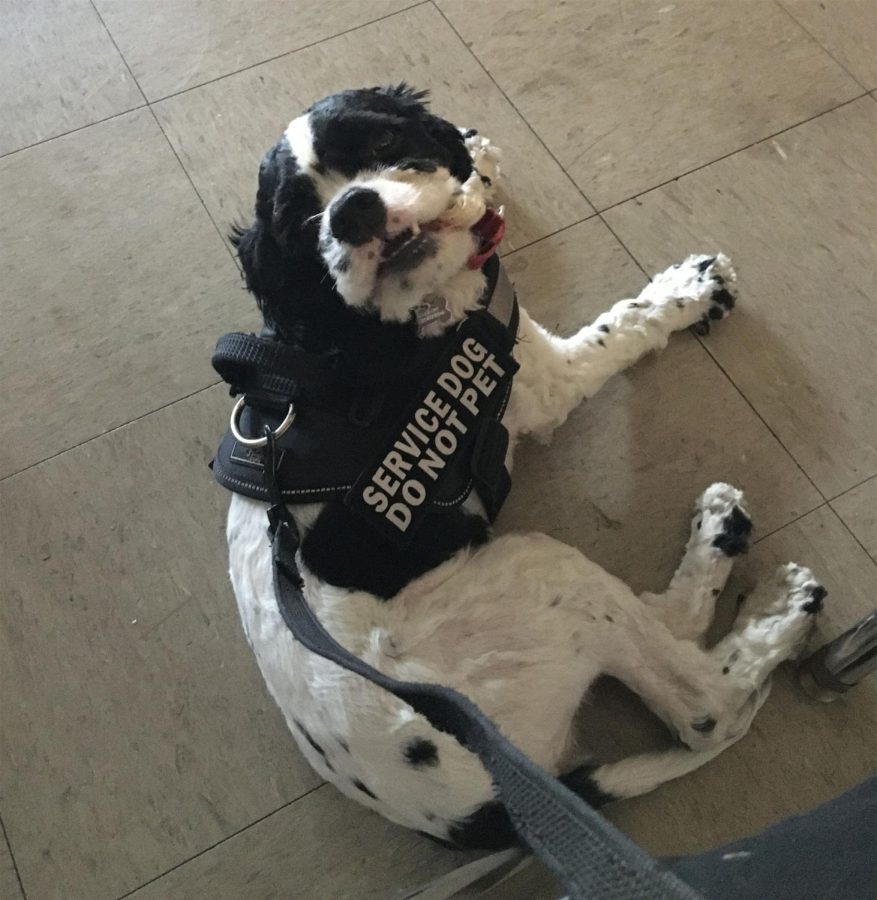Feb. 20 marks National Love Your Pet Day and the holiday reiterates what San Diego State students already know: pets are a special part of life.
The SDSU community represents a variety of demographics, but the emotional support animal (ESA) population is noteworthy. ESAs, animals prescribed by medical professionals for comfort, boost academic success by providing tender love and care to students in their vigorous pursuit of higher education.
A senior psychology student, who wishes to be anonymous for privacy reasons, has had her ESA for nearly three years. Without her ESA, the student says she would not be able to succeed in college without her.
“My ESA lowers my anxiety levels, making it possible for me to function and get out of bed and go to classes,” the student said. “When I am stressing about an exam and on the verge of a panic attack, my dog is the one that lays on my lap for hours so I can calm down and get my studying done.”
With her therapist’s recommendation, the student chose this route of professional help because she needed extra support with her mental health struggles beyond her therapist’s office.
“I have comfort and I always have someone to come home to that is excited to see me and makes me feel loved,” the student said. “I have an important responsibility being a dog parent so it ensures I get out of the house and walk each day, and that I stick to a schedule so my dog is cared for in all the ways she needs to be.”
Similarly, after being diagnosed with depression and anxiety, junior nursing major Cindy Koh sought out accessible options. Koh has had her dog, who became a registered ESA in August 2021, since she was 12.
“My dog has been emotionally supporting me since I was little, I just wasn’t diagnosed back then,” Koh said. “I think the biggest benefit of having an ESA is knowing that she loves me no matter what and there is never any judgment.”
Just like ESA’s, service dogs — dogs who have been strictly trained to work and perform tasks for a person with a disability — can provide emotional support.
Unlike ESA’s, service dogs are permitted to enter residence halls, classrooms and public areas on campus to provide necessary assistance under the control of their owner.
Junior theater arts major Karen Díaz has had their service dog, Snoopald “Snoopy” Leopold Trooper, for a year.
“Snoopy is a great student. Even though he sleeps in class sometimes, all of the professors love him,” Díaz said. “When I have an anxiety attack, he licks my face and lays on me, which helps ground me. When I try to hurt myself, or when he senses I’m ‘acting weird,’ he alerts me and directs my attention towards him. Sometimes he knows before I even realize what is happening. When I have a depressive episode, he helps me get out of bed and get outside. Not to mention seeing his ears flopping as he runs is the best antidepressant.”
Díaz said Snoopy helps them in social situations on campus like making new friends.
“I also feel that Snoopy is a great way to make new friends. I’m very shy, so having Snoopy makes talking easier as it directs their attention to him and not me,” Díaz said.
While service dogs have a job of their own, they are still dogs who will occasionally want to go about their own agenda instead of working.
“Some people don’t realize that service dogs are still dogs,” Díaz said. “There are some days where they don’t feel like working, or are too restless because they want to play. As much training as you give them, they are bound to make some mistakes.”
Students considering getting an ESA or service dog must uphold pet parent responsibilities, which can be taxing on those who aren’t prepared for that level of commitment.
“Having a dog as an ESA is not easy in college, and I would only recommend this to students who have time to fully take care of a dog and treat them the way they deserve,” Koh said. “Yes, the ESA is there to support you, but it isn’t fair if you can’t take care of them. Cats are more low-maintenance so I would recommend a cat as an ESA for people that don’t have as much time to take care of a dog.”
Caring for pets, including ESAs and service dogs, is a never-ending role, and students need to embrace the ups and downs of the journey.
“Another thing to keep in mind is that training goes on forever, you have to reinforce their habits. So I’d recommend it, as long as you do your research and are willing to go through some unpleasant times,” Díaz said.












